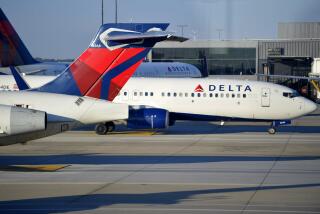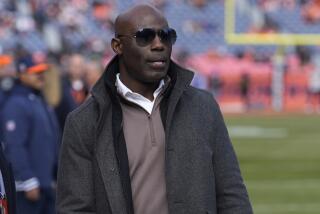Uli Derickson, 60; Was Lead Flight Attendant on Hijacked Jet
- Share via
Uli Derickson, a flight attendant who displayed remarkable courage while dealing with terrorists threatening passengers aboard a hijacked international flight in 1985, has died. She was 60.
Derickson, who had been battling cancer since August 2003, died Friday at her home outside Tucson, her son, Matthew Derickson, told The Times.
Derickson was the lead flight attendant on TWA Flight 847, carrying 152 passengers and crew on a flight from Athens to Rome on June 14, 1985. Just after takeoff, two Lebanese gunmen commandeered the plane and started it on an odyssey of terror and brutality throughout the Middle East.
The violence was immediate. Derickson took a karate kick to the chest from one of the hijackers and hit the ground before being kicked again. One of the hijackers forced her to go with him into the cockpit, while the other -- who was holding a grenade with the pin removed -- started kicking open the door. Once inside, they pistol-whipped the pilot and flight engineer.
The terrorists spoke no English, but, as Derickson found out, one spoke German just as she did. This put her at the center of the drama for the next 55 hours as she translated the tense communication between the plane’s crew and the hijackers.
The plane was diverted first to Beirut, where Derickson successfully pleaded with the hijackers to obtain the release of 17 elderly women and two children.
After they slid down the escape chute, the plane was quickly back in the air, headed this time for Algiers, while the hijackers pressed their demands for the release of hundreds of Lebanese prisoners held by Israel. While en route, the hijackers forced Derickson to collect the passports of all on board and demanded that she identify all the Jews. Derickson told them that the passports did not indicate religious preference and found ways to shield certain names from the hijackers.
Once in Algiers, a dispute broke out between the cockpit and the ground crew, which wanted to get paid for fuel. As Derickson recalled in a present-tense narrative for People magazine: “They are screaming for cash or a credit card, and the hijackers are threatening to kill one passenger every five minutes if we don’t get the fuel. The co-pilot is screaming his lungs out to the ground [crew] not to be stupid, we don’t carry a charge card.... I asked for permission to go to my purse, and I got out my [credit] card and gave it to them. They put 6,000 gallons of jet fuel on my Shell credit card, about $5,500 worth.”
The mood grew darker as the plane flew back toward Beirut. The hijackers had earlier identified some American military personnel on the flight, including Robert Dean Stethem and Clinton Suggs, both Navy divers, and Kurt Carlson, an Army Reserve officer on active duty.
On the way back to Beirut, they singled out Stethem, bound him and beat him severely with the arm of a chair. Suggs and Carlson received similar treatment. After the plane landed in Beirut, Stethem was shot to death and his body dumped on the airport tarmac.
The hijackers then renewed their beating of Suggs, vowing to kill him.
As Suggs later recounted, Derickson put herself between him and the hijackers and screamed at them, “Enough! Enough!” before they relented and left him alone.
Islamic militiamen boarded the plane in Beirut to assist the hijackers. Some time later, the plane was airborne again and heading toward Algiers.
On the last stop there, Derickson, along with the other flight attendants and many of the passengers, were released. But 39 American men were flown back to Beirut, where they were held for 17 days. They were finally exchanged for just 31 of the more than 700 prisoners the hijackers had originally sought.
Life was less than peaceful for Derickson after the hijacking ordeal ended. She returned to her New Jersey home with her husband, Russell, a retired TWA pilot, and her son, Matthew. But unfounded reports, including some in the mainstream news media, that she had given the hijackers names of Jewish passengers on the flight brought threats from extremist groups. When the truth about her efforts to shield Jewish passengers was verified, she received threats from others. The family relocated to Arizona.
Derickson was born in what is now the Czech Republic. She and her parents, who were German, were expelled in 1945 and sent to East Germany. They escaped to West Germany a few years later.
Derickson worked at a bank, at a car dealership and as an au pair in Switzerland and Britain before moving to the United States in 1967. She had a job in Connecticut as an au pair before she went to work for TWA.
She resumed flying with TWA soon after the hijacking, retiring in the late 1980s. She tried working in real estate but found she missed flying, so she joined Delta Air Lines in the early 1990s. She continued flying, working mainly international flights, until she was diagnosed with cancer in 2003. Her husband died that year.
In the late 1980s, she acted as a consultant for the NBC-TV movie, “The Taking of Flight 847: The Uli Derickson Story.” Actress Lindsay Wagner played Derickson. The film was nominated for five Emmys in 1988.
She also testified in West Germany at the trial of Mohammed Ali Hamadi, one of the hijackers convicted of murdering Stethem. He received a life sentence. She advised TWA, Delta Air Lines and the FBI on crisis management.
Throughout her life, she didn’t see herself as a hero.
“They threw me a hot potato, and I had to handle it,” she said.
More to Read
Sign up for Essential California
The most important California stories and recommendations in your inbox every morning.
You may occasionally receive promotional content from the Los Angeles Times.













